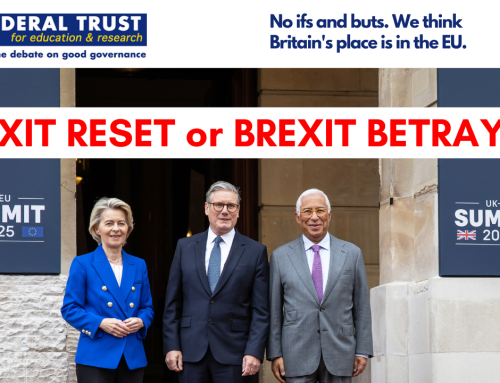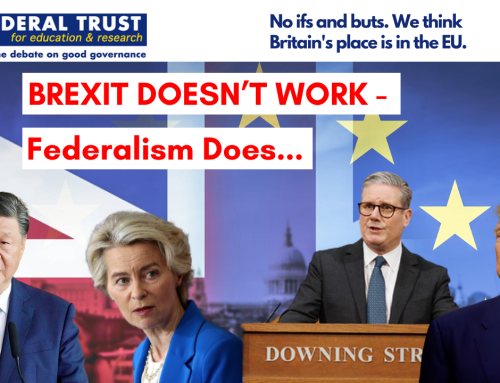Yesterday’s summit between the Prime Minister and President Macron, on the margins of the latter’s visit to celebrate the 80th anniversary of General De Gaulle’s broadcast from London in 1940 announcing his resolution to continue fighting in the name of France, thereby denying and defying his country’s official surrender to the Nazi invaders, cast a singular light on Britain’s current Brexit predicament.
First there was the trivia of the occasion. The breathless suggestion from the British side that a compromise in the ongoing negotiations for the terms governing the United Kingdom’s future relationship with the European Union on the fraught issue of maintaining a “level playing field” might finally be forthcoming. This would consist of the UK asserting the right to diverge from EU regulations regarding workers’ rights, environmental standards and state aid, whilst the EU confirms its capacity to impose tariffs at any time upon British exports to the Union should such divergence occur, with disputes to be determined by a new independent arbitration body. A moment’s reflection will reveal that this would be either essentially no deal, or the UK remaining in the EU without any say over its law making, and, in any event would mean the arbitrators would need to be in more or less permanent session. Unfortunately, even so great an increase in employment opportunities for British lawyers will not remotely compensate for the certain loss by London of legal services for European corporates Brexit must entail.
London. This aspect of the occasion was a little more serious. Despite the current climate of criticism of ethnic stereotyping, several of our more determined anti-Europeans could not completely contain their Francophobia, and expressed outrage that the award of the Legion d’Honneur by the President to the city, in gratitude for its hosting General De Gaulle and the Free French movement he founded in the moment of France’s supreme need, constituted some sort of snub to the rest of Britain. But of course London has always been different, and no more so than now, when it faces the multiple challenge of being expected to pay for a Brexit which will undermine a considerable portion of its present wealth and future earning capacity, and for which, by a large margin, it did not vote in 2016. That vote, by the rest of Britain, albeit by a narrow margin, was at least as much one against London, as it was against Brussels. And the poison brewed by this fact is only just beginning to properly work itself into and through the whole body of British politics. There have indeed been periods of our history when the rest of Britain has promoted and pursued policies wholly opposed to the fundamental commercial and cultural interests of London, but they have never lasted long.
Which leads logically to the serious core of yesterday’s occasion: the relevance of De Gaulle for the Britain of Brexit. Again, British anti-Europeans have long regarded the general as a hero. After all, has not his twice vetoing Britain’s application to join the then European Economic Community been fully vindicated by our decision to leave today’s EU? And his recognition that we would always choose America (not Churchill’s “the deep blue sea”, for Algeria had taught him at least that the age of European imperialism had passed forever) over our own continent: that we preferred the simplicity and glamorous style of power through the status of special satellite to Washington over the complexity and grubby substance of power in a partnership of equals conducted in Brussels? Yes and no. Dr Gaulle’s views of Britain, and America, and Europe, were demonstrably superficial, wholly dictated by, and subservient to, his truly profound perception of the nature of France and her interests. He felt, instinctively, “comme un mage” as Andre Malraux put it, her greatness and her weakness: above all, he felt viscerally the humiliation, to which both had led her in 1940, and that allowed him, with complete clarity, to perceive the path by which that humiliation could be reversed and eventually purged by restoring her place amongst the leading nations of Europe.
Perhaps the principal reason for Brexit is precisely that Britain did not experience such a humiliation in 1940? That France’s historically darkest year is our brightest? That the European Union is indeed a community of the defeated and degraded, who have learned, in acute agony, the depths to which, divided, they can sink, and from which only united, they have restored, and have a chance of sustaining, their higher natures? Certainly, contemporary Britain shows, to continental observers, an astonishing insouciance towards political, economic, social and cultural developments, which their much harsher historical experience has taught them to recognise as warning signs of imminent danger, decay and destruction. France’s humiliation in 1940 was merely the military culmination of a general crisis which had been building within the nation for many years before, and which extended for many years thereafter, even beyond De Gaulle’s transformative presidency. Similarly, the deficiencies and divisions within Britain, which led to the result of the 2016 referendum, go back many years, and going forward, have stored up potentially decades more of damage. For not only French commentators have made the comparison between the humiliation Britain is now inflicting upon itself through Brexit and that which France inflicted upon itself in the 20th century.
So British pro-Europeans should study l’homme du 18 Juin. Like him, we should recognise that our defeat need not be final, that externally, very powerful global forces are arrayed against its permanence, as are, even more, internally, the material and moral interests which define our innate national identity. That the enthusiasm of a motivated minority, and the acquiescence of an exhausted majority, will not indefinitely exclude a campaign to reverse the referendum decision. But also, like him, we should recognise that such a reversal must entail a wholesale renewal of our sense of ourselves, and of our place in the world, as a leading European people. We have lost a battle, but we have not lost the war.






